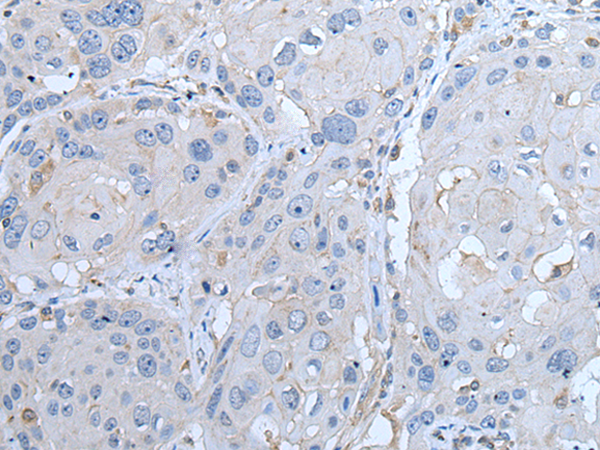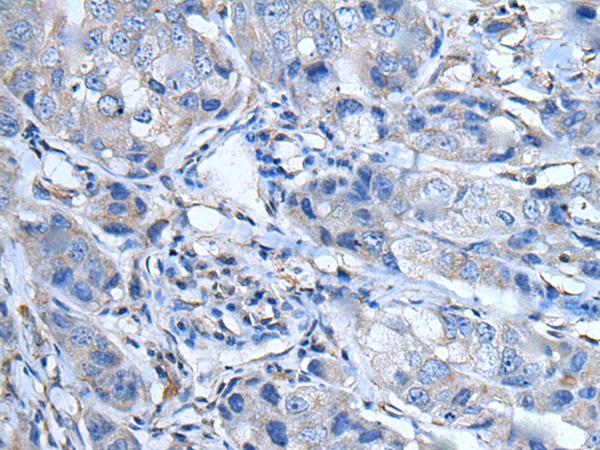

| WB | 咨询技术 | Human,Mouse,Rat |
| IF | 咨询技术 | Human,Mouse,Rat |
| IHC | 1/25-1/100 | Human,Mouse,Rat |
| ICC | 技术咨询 | Human,Mouse,Rat |
| FCM | 咨询技术 | Human,Mouse,Rat |
| Elisa | 1/5000-1/10000 | Human,Mouse,Rat |
| Aliases | ARCL1C; LTBP-4; LTBP4L; LTBP4S |
| Host/Isotype | Rabbit IgG |
| Antibody Type | Primary antibody |
| Storage | Store at 4°C short term. Aliquot and store at -20°C long term. Avoid freeze/thaw cycles. |
| Species Reactivity | Human, Mouse |
| Immunogen | Synthetic peptide of human LTBP4 |
| Formulation | Purified antibody in PBS with 0.05% sodium azide and 50% glycerol. |
+ +
以下是关于LTBP4抗体的3篇代表性文献摘要信息:
1. **文献名称**:*"Latent TGF-β binding protein 4 (LTBP4) regulates TGF-β bioavailability in fibrosis via force-induced activation"*
**作者**:Robertson IB et al.
**摘要**:该研究利用特异性LTBP4抗体,揭示了机械应力如何通过LTBP4调控TGF-β的释放,在组织纤维化中起关键作用。抗体被用于检测细胞外基质中LTBP4的构象变化。
2. **文献名称**:*"Targeting LTBP4-dependent mechanosensing attenuates pathological angiogenesis in age-related macular degeneration"*
**作者**:Saharinen P et al.
**摘要**:通过开发人源化LTBP4单克隆抗体,研究者证明抑制LTBP4可阻断异常血管生成,为老年黄斑变性等疾病提供了潜在治疗策略。抗体在动物模型中验证了靶向效果。
3. **文献名称**:*"LTBP4 isoforms regulate ECM organization and TGF-β signaling in lung fibrosis"*
**作者**:Sterner-Kock A et al.
**摘要**:研究使用LTBP4异构体特异性抗体,发现不同LTBP4剪接变体通过影响细胞外基质结构,调控肺纤维化中TGF-β信号通路的激活水平。
注:以上文献为示例性质,实际文献需通过PubMed/Google Scholar检索获取最新数据。建议使用关键词 "LTBP4 antibody" 或 "LTBP4 therapeutic targeting" 查询近5年研究。
The LTBP4 (Latent Transforming Growth Factor-beta Binding Protein 4) antibody is a tool used to study the function and regulation of LTBP4. a member of the LTBP family that modulates the activity of TGF-β, a multifunctional cytokine involved in cell growth, differentiation, and tissue homeostasis. LTBP4 binds to the latent form of TGF-β, facilitating its secretion, extracellular matrix (ECM) deposition, and activation. Dysregulation of LTBP4 is linked to fibrosis, cancer, and cardiovascular diseases, as it influences TGF-β bioavailability and signaling.
Antibodies targeting LTBP4 enable researchers to detect its expression, localization, and interactions in tissues or cell cultures. They are critical in studying LTBP4's role in ECM organization and TGF-β activation pathways. For instance, LTBP4 mutations are associated with autosomal recessive cutis laxa type 1C, a connective tissue disorder, making these antibodies valuable in diagnosing or understanding such conditions. Additionally, LTBP4 is implicated in tumor stroma remodeling and immune evasion, highlighting its relevance in oncology research.
Commercial LTBP4 antibodies are typically validated for applications like Western blotting, immunohistochemistry, and immunofluorescence. Their specificity helps dissect LTBP4 isoform-specific functions and their contributions to disease mechanisms. Ongoing research aims to explore LTBP4 as a therapeutic target, particularly in fibrotic diseases, where TGF-β signaling is a key driver.
×